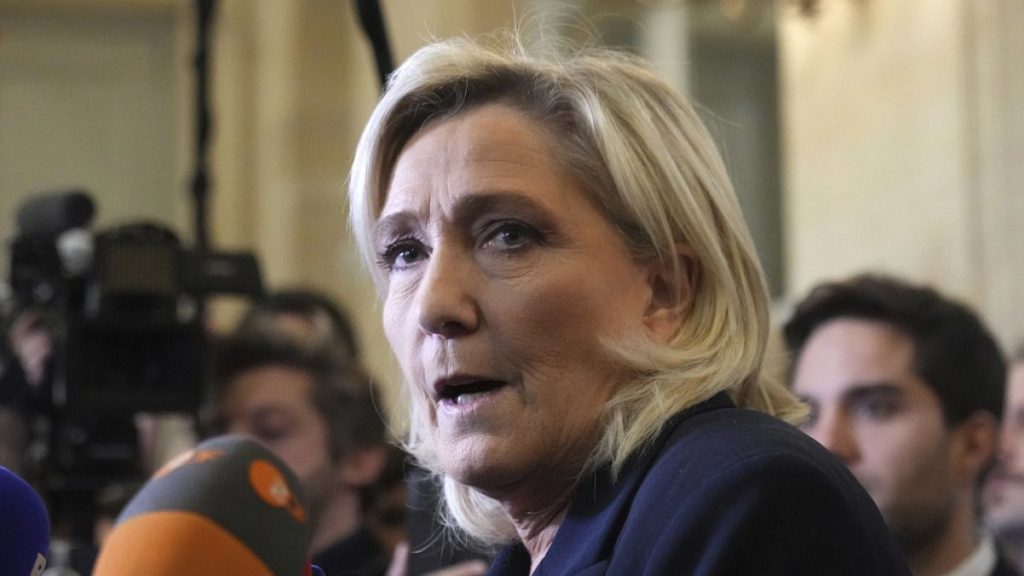France’s political landscape is currently engulfed in turmoil, as Prime Minister Michel Barnier faces an imminent no-confidence vote anticipated to strip him of his position. The catalyst for this upheaval is the social security budget, which failed to garner the necessary support from Marine Le Pen’s National Rally (RN). Le Pen, the prominent far-right leader, articulated her party’s position by claiming that supporting the no-confidence motion is the sole constitutional avenue available to safeguard the public against what she described as a “dangerous, unjust and punitive budget.” With the no-confidence vote scheduled for Wednesday evening, Barnier finds his fragile coalition government on the brink of collapse, raising concerns not only within France but also across the eurozone.
On Monday, in a decisive move to push through his contentious social security budget, Barnier resorted to Article 49.3 of the French Constitution, a rarely invoked mechanism that allows the government to bypass parliamentary voting. This tactic came after a prolonged political standoff where Barnier attempted to broker support from the RN. Despite his last-minute concessions—including the abolition of proposed electricity price hikes and a reduction in healthcare coverage for undocumented migrants—these changes proved insufficient to assuage the concerns of Le Pen and other opposition leaders, who swiftly called for the no-confidence vote following Barnier’s controversial use of the constitutional provision.
The proposed budget is poised to enact significant austerity measures, including €40 billion in public spending cuts and a €20 billion increase in taxes. Both the RN and a left-wing coalition have proposed no-confidence motions against Barnier, and Le Pen has publicly committed to supporting the leftist motion. This bipartisan opposition is expected to consolidate enough votes to oust Barnier, potentially marking the first instance in over sixty years that a French government is unseated through such a mechanism. If successful, this would render Barnier as the shortest-serving Prime Minister France has seen since the establishment of the current Fifth Republic in 1958.
Barnier was appointed by President Emmanuel Macron in September with the dual mandate of maneuvering through an increasingly fractured National Assembly and addressing the nation’s surging deficit. His proposed budget aimed to reduce France’s fiscal deficit from an estimated 6% of GDP to 5% in the upcoming year. The Prime Minister warned last week of dire consequences should the budget fail to secure approval, indicating that such a failure could lead to considerable volatility in the financial markets. The prolonged standoff surrounding the budget has already negatively affected France’s stock market, with the nation’s borrowing costs, at one point, surpassing those of Greece for the first time in history.
Should the no-confidence vote proceed as expected, President Macron may request Barnier to remain in a caretaker capacity while he seeks a suitable replacement. The situation is further complicated by the approaching deadline of December 20 for the social security bill’s adoption by parliament. If this deadline is missed, the interim government could resort to a special emergency law to extend the current year’s budget into 2025, thus averting immediate fiscal disruption. However, such a measure would only serve as a temporary fix, and the urgency to establish a stable governance structure remains paramount.
As France grapples with this political crisis, the implications extend beyond the nation’s borders. Investors and foreign markets are closely monitoring developments, wary of the potential fallout from an unstable French government. The prospect of Barnier being ousted raises critical questions about the future direction of fiscal policy in France, particularly concerning austerity measures in the ongoing context of economic recovery post-pandemic. With the ongoing standoff, the feasibility of Barnier’s ambitious budgetary goals appears increasingly precarious, leading to heightened uncertainty in both the domestic and European economic landscapes.














